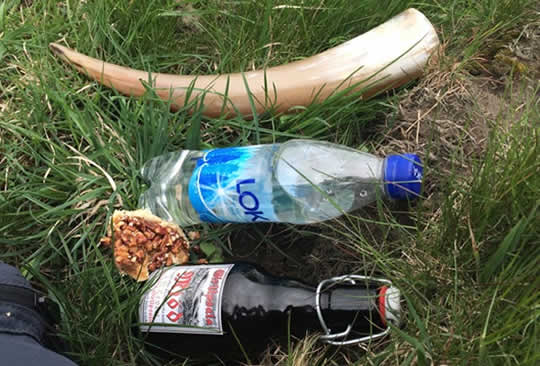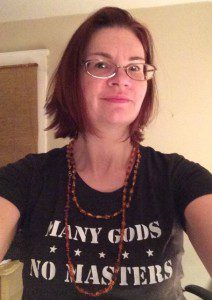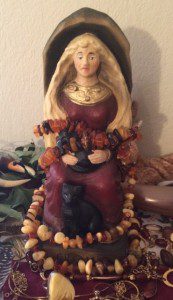Heathens have a wide variety of spiritual experiences. Some Heathens have little or no direct experiences with the Gods, while others develop devotional relationships with one or more Heathen deities. Of those who do have direct experiences with deity, many have been “chosen” by their individual deities, rather than vice versa. Others, such as myself, consciously seek out and grow a relationship with the deity of their choosing. Not all Heathens are as interested in a devotional relationship with a deity, and it is by no means necessary for all Heathens to develop one. However, I have found that this is the spiritual model that works best for me.
Where I’m Coming From
I am a Heathen and a Devotional Polytheist now, but I was not raised this way. I was raised Congregationalist–one of those Protestant sects that came over with the Mayflower. Congregationalism is (and was, when I was a kid) about as close as a Christian church can get to being Unitarian while remaining under the Christian umbrella. As a result, I am not the stereotypical “recovering Catholic” kind of Pagan. I did not run to Paganism to escape some kind of repressive Christian upbringing, either in theology and praxis. If anything, I what I was attempting to recover from was the distinct lack of mystery and connection with the Divine that the church of my childhood offered.
Growing up, I’d always been interested in mythology, folk tales, ancient cultures, and symbolism. By the time I hit high school, I was reading tarot cards and researching Celtic and Native America mythology. I read books by Charles de Lint and Morgan Llewellyn–I particularly liked her book Druids–and my goal was to be a Druid; failing that, an Egyptian archaeologist. I listened to Enya, I made homemade candles and herbal teas, I owned a dreamcatcher, and I wore a medicine bag around my neck. Looking back, despite my very active involvement in my church, I had all of the hallmarks of an early 90s Pagan just waiting to happen.
In my opinion, most Pagans have a story about the point in their life at which they realized that there are many more spiritual options, and chose to leave the belief system of their childhood. Mine came before I found out that any version of modern Paganism existed. I had been sitting in my hometown church with my family at the Christmas Eve service during my first winter break in college. The Christmas Eve service–with its darkness, candles, music, and time for reflections–had always been my favorite, and it is about as “woo-woo” as my church ever got. Coming back after my first semester away at school with no church involvement, I had needed to feel something, but I was surprised and disappointed to find that the service just felt empty. I didn’t know what was missing, specifically, I just knew that I needed something more, and that somehow my beloved church did not have it. Two weeks after I returned to college, I attended a lecture by the local Eclectic Wiccan circle on “Wicca, Druidism, and Neo-Paganism,” and I knew that I had found it. I’ve considered myself Pagan ever since.

Next Stop: Heathenry
So, I walked into Paganism specifically seeking that divine connection. I also was strongly interested in connecting with my ancestors and my heritage. As it happens, by ancestry I’m Norwegian, Swedish, and German, and as soon as I found out that Heathenry existed, and that there was a spiritual movement which honored the Gods of pre-Christian Northern Europe and attempted to recreate some of the spiritual practices of those cultures, I signed right up. Right away, I found that I loved the sense of community that Heathen events had, the “low-church” ritual format, and that we interacted with the Gods and ancestors as if they were specific individuals who had agency (though I didn’t know to apply this term to my experience at the time). And, I just loved the “feel” of the Norse gods and their mythology. Though I loved Ireland and all things Celtic, the Irish Gods and their myths had never really sat right with me. Even during the four years that I was Wiccan, I was “Norse Wiccan”, because when I did a divination to figure out who my deity Patrons were, I got Freya and Odin. (Freya and Odin: who I now know to be the unofficial Heathen Recruitment Team.)
Though I ignored Odin for many years, Freya sounded really cool (Viking Goddess of Love, Beauty, Sex, Magic, and the Chooser of the Slain? Yes, please!). She also felt very familiar, and I actively sought to build a relationship with Her. I read Her myths and relevant Viking Age history and archaeological finds. I built Her an altar, wrote Her poetry, and lead classes and rituals in Her honor. Eventually, I ended up doing a long series of shamanic-type journeys to speak with Her, at the end of which I decided to dedicate myself to Her. I was blessed throughout this ten or so year process in that my Heathen communities in both Kentucky and California fully supported the kind of direct personal relationship with the deities that I always desired.
Magick or Deity?

But neither Pagan nor Heathen equal Polytheist, a distinction which, until fairly recently, I honestly hadn’t able to wrap my mind around. All I knew was that I had spent many years being Pagan (I consider “Heathenry” to be a subset of “Pagan”) wondering why most Pagans I knew put such an emphasis on spells and magick. While I was an Eclectic Wiccan, I enjoyed learning about the various uses of candles, herbs, stones, and Kabalistic correspondences, but it never felt like most books or classes or even rituals addressed what, to me, were the most important issues: who the Gods are; what we believe about them; how to honor Them appropriately; and how to experience them directly.
To me, that was always the entire point: this is a religious choice, and I want to interact with the divine. Most of the Heathens I knew and worshiped with focused mainly on the Gods, ancestors, and landspirits (“landwights”) and attempted to reconstruct parts of the old spiritual practices, so it really took me a long time to understand that some Pagans, including many Heathens, are just not that interested in the Deity end of things. (Howwever, FWIW, I think that Heathenry–and all of the other reconstructed-ish religions–lend themselves very well to a Devotional Polytheist model.)
Dealing with Doubt
For as long as I can remember, Freya has been interested in me, and any problems and setbacks that came up in building our relationship were due to me, not Her–my academic mindset; my modern skepticism; my fears of becoming a crazy person who hears voices; and my underlying doubt that, despite my fervent hopes, a deity would never actually be interested in someone as boring or untalented as me. As far as I am aware, the problem with growing our relationship had never been Her.
The “academic” problem was the first—and, for me, the biggest—one to deal with. I have been studying modern Pagans since the day that I found out what Paganism was–literally. In undergrad, I majored in Cultural Anthropology with a minor in Comparative Religion, and as I tend to be lazy, I combined many of my assignments with the Pagan events/topics that I knew I would be attending. This tendency served me fairly well until grad school, where I first encountered Heathenry. I started to notice that my spiritual practice was not as satisfying as I had hoped it would be. I found that each time I did this–tried to be a participant and an observer, as we learn to do in the social sciences, I felt that I was short-changing myself. For me, personally, I couldn’t have it both ways; I couldn’t continuously step outside of my spiritual practice and analyze myself and others as if I had no personal connection with my Gods or people in my spiritual communities. To get the level and type of spiritual connection that I wanted, I had to choose one mode or the other. So I switched my Master’s thesis topic to something completely unrelated to spirituality and stopped enthographizing Heathen and Wiccan rituals.
Still, it took many years of specifically and intentionally rewiring my brain to loosen up that ethnographic mindset enough so that my brain would stop reporting and analyzing what was happening around me, and start acknowledging the experiences that I was having instead.
As for the other issues, I still experience bouts of “religion is nonsense fed to the gullible” and “so I hear voices in my head… that can’t be good”, but they are much less frequent than the used to be as well. And any time I try to convince Freya than I’m really just not that interesting or lovable or valuable, well… if you’ve ever read my blog, you can probably guess the reaction any of us get from Her on that. 🙂
Being a Devotional Polythiest

My devotional relationship with Freya took over ten years of wooing on both of our parts before I took the leap and made it official. After my relationship with Her was cemented, however, other deities started popping by and making themselves known. In general, in my experience, once you make it clear that you are open to and interested in forming a relationship with one deity, others are sure to stop by and say “hi”. I blame Zeus’s sudden appearance in my life on the fact that I was, at that point, the ear for five Hellenic Pagans lamenting the lack of groups in the Bay Area. Freyr’s involvement I blame on Freya, because as I found out, you don’t often get one without the other. And Odin, well… Odin is patient, not forgetful.
Long story short, here I am. A Heathen and a Devotional Polytheist, dedicated to a Goddess I love and experiencing ever-evolving relationships with many different deities, both from the Norse tradition and outside of it. Blessed with a deep connection with my primary Goddess and a strong faith that, even in bad times–especially in bad times–I can rely on to see me through. Faith strong enough for me to walk on, as I like to say. And, benefits that outweigh the challenges and uncomfortableness that sometimes comes with walking a Polytheist path and being Her priestess.
Despite my occasional bitching, I wouldn’t have it any other way.

Patheos Pagan on Facebook.

the Agora on Facebook
Happily Heathen is posted on alternate Fridays here at the Agora. Subscribe by RSS or e-mail!
Please use the links to the right to keep on top of activities here on the Agora as well as across the entire Patheos Pagan channel.
All photos courtesy of the author.













